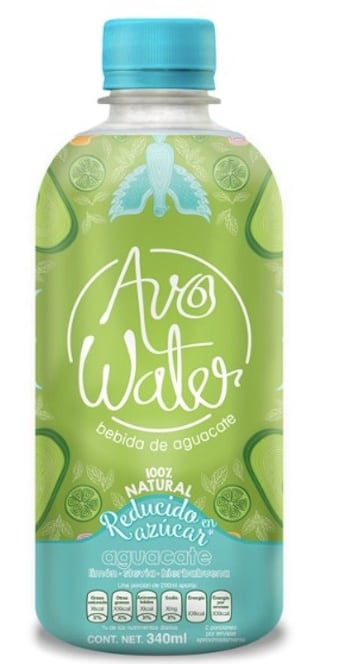The preservative-free, ready-to-drink avocado water, made with avocado, fresh lemon juice and peppermint, is high in fiber, vitamins and protein and comes in three variants: stevia, pure cane sugar and a blended sugar-stevia option. AvoWater wants to roll out its 500ml and 360ml bottles into the US market. The drink is currently packaged in PET bottles but the company has recently rolled out 100% biodegradable bottles made using avocado seed resin.
Evelyn Escalera, co-founder and operations director at AvoWater, said the company was just finalizing the last modifications on packaging and labeling and would be ready to launch the product into the US within two to three months.
“The main goal for this year is to get AvoWater into the US. We already have prospects there... We want to start expansion into California and after Texas – those two states first of all and then onto others,” Escalera told FoodNavigator-LATAM.
Within the next five years, Escalera said the company wanted AvoWater to be strongly established in the US and have launched into other markets like Europe, primarily France, Germany and the UK.
From pulp to drink
Established in 2014, Grupo Escamp previously just manufactured and exported avocado pulp and dips like guacamole, Escalera said, and only started making the drinks in 2016.
“We were thinking: there's ice-creams of avocado, there's lollipops, so there has to be a beverage. We were looking for it and there wasn't any beverage on the market, so we started doing some experiments; mixing up different ingredients until we got AvoWater.”
The company finalized its recipe after around 6-8 months of development, she said, settling on a blend of lemon and peppermint and launched into natural product and gourmet specialty stores across the main cities in Mexico.

So, what does 'avocado water' taste like?
“The avocado by itself does not have a regular flavor, so we needed to put some other ingredients in that provided flavor like lemon and a kind of freshness with the peppermint... We wanted AvoWater to provide health and hydration – we were thinking about those benefits – and the main ones that bring that sensation and flavor are the lemon and peppermint.”
“...It's not as heavy as a juice but it's not as liquid as water; it's in between because it has body. When you drink it, it gives you energy; it fills you up. That's one of the main benefits,” she said.
Each green-colored beverage contained 30-60g of avocado, Escalera said, which equated to the recommended daily portion from a nutritional standpoint.
She said that, right now, the brand didn't have much competition because there weren't really other avocado drinks like it on the market. Competition, she said, would likely be products like coconut water or juices because it targeted a similar consumer.
“Our main consumers are between 18 and 45, women and men, and mainly people that are focused on a healthy lifestyle or taking care of their health.” Although, she said the AvoWater made with pure cane sugar was extremely sweet and therefore also appealed to soda drink consumers.
“We're really broad and also because we have the one with stevia, we can target people with diabetes or people who don't want to consumer any type of sugar.”
The forgotten seed...
Escalera said AvoWater was bottled using high pressure processing (HPP) technology and had two bottle variants – regular PET bottles and 100% biodegradable bottles made from avocado seed resin that it was focused on upscaling in the future.
The company worked in partnership with a Mexican biodegradable specialist to manufacture the avocado-based bottles. The specialist had already developed the avocado seed resin and was making things like disposable cutlery but never bottles, she said, so AvoWater partnered with them to refine the process and production of bottles using this material.
Escalera said avocado seed resin had the same qualities as plastic for packaging but when composted, it degraded within a year and if put in the regular trash degraded within three years.
The biodegradable bottle cost around 45% extra than the regular PET bottle variant, she said, but so far Mexican consumers had been willing to pay the price.
“It's been a little more difficult in Mexico but the people we're focusing on, our target market, they're willing to pay it. So, it's a good indicator.”
“...Right now, we're using more PET because we're just introducing the biodegradable bottle,” she said, but the focus was to work on upscaling the biodegradable variant. The idea for the US launch was to offer 50:50 variants of PET and biodegradable bottles.
